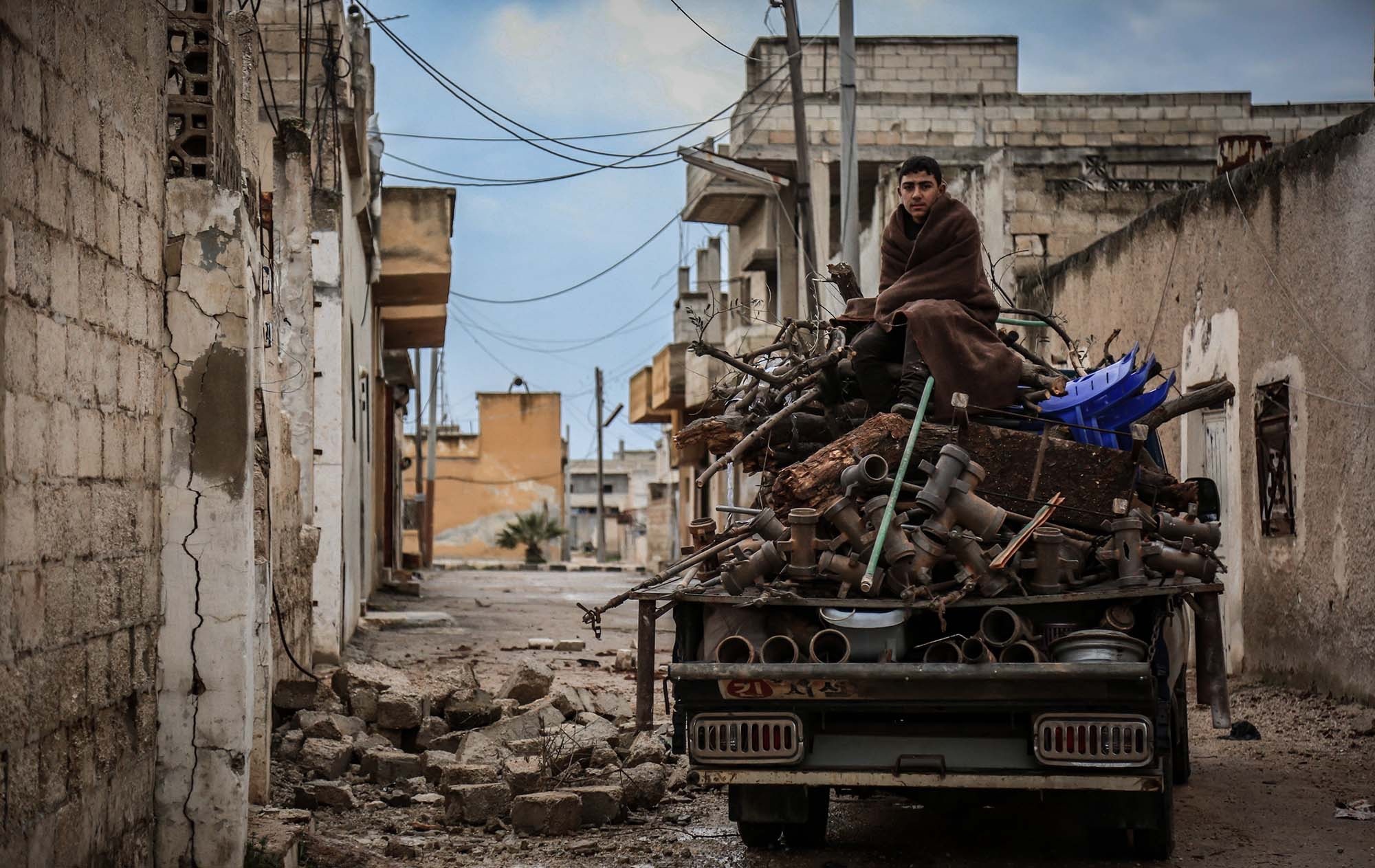
In the main street of Kastanies, a remote town on Greece’s northern land border with Turkey, army trucks head for the frontier loaded with mesh and razor wire. The convoy of military vehicles through the region has been growing over the past week in response to a purported ‘provocation’ by Turkish President, Recep Tayyib Erdogan. One local likens the mood to the build-up to a war. Greece is not, however, preparing for any armed conflict—it is erecting a barricade against the human consequences of one.
When at least thirty-three Turkish soldiers were killed in Syria’s Idlib province on 28 February (the biggest single day of losses in Turkey’s modern military history), Erdogan responded by ordering guards at its land and sea borders with Greece to step down to allow some of the four-million refugees in the country to enter Europe. The move signalled a breach of the 2016 so-called ‘EU-Turkey deal’ in which Brussels pledged Erdogan €6bn in assistance in exchange for curbing migration flows into Europe. Yet four years on, Turkish officials claimed the country now has ‘no choice’ but to relax border controls, given the dearth of support it has received as host to some 63 per cent of the world’s refugees (around 3.5 million Syrians among them). The migrants were now Europe and the world’s problem, it said.
The step was widely interpreted as a cynical measure by Erdogan to blackmail the EU, and thereby NATO, into supporting his campaign against Assad and his Russian backer in Idlib. And it was met with equal cynicism. Within hours of Turkey’s announcement, Greek Prime Minister Kiriakos Mitsotakis stated that his country was increasing its border security. “No illegal entries into Greece will be tolerated,” he said. “Greece does not bear any responsibility for the tragic events in Syria and will not suffer the consequences of decisions taken by others.”
When thousands of migrants gathered at Turkey’s sealed border over subsequent days to be met with violent assault, push-backs and even alleged killing by open fire from Greek border guards, Mitsotakis’ government suspended all asylum claims to the country (a measure with no basis in international law). During a hurried meeting with Mitsotakis at the border on 3 March, European Commission president Ursula von der Leyen later praised Greece’s efforts, announcing an additional €700m EU assistance to the country. “This border is not only a Greek border, it is also a European border,” she said. “I thank Greece for being our European aspida [shield] in these times.” With the EU readying itself for an emergency meeting on Idlib, the statement aptly conveyed its stance on the crisis inside Syria: a scourge to be kept from its borders at all costs.
As the conflict this month marks its ninth year, it seems President Bashar al-Assad is making good on his pledge to retake “every inch of Syria.” The country’s north eastern Idlib province remains the last rebel-held enclave, sustained largely through Turkish military support. It is to Idlib that since 2014 residents of other former opposition-controlled areas have been steadily evacuated on green buses, as the regime and its allies beat back dissent through an indiscriminate campaign of air power, ground troops and artillery bombardment of civilians. Such a strategy is now being deployed against Idlib, courtesy of Russian President Vladimir Putin, displacing its some 3 million residents into ever-narrower tracts against the Turkish border.
Circumstances in Idlib have been described by the UN as the worst humanitarian crisis yet in a war whose death-toll extends into hundreds of thousands and whose atrocities have become immeasurable. The ceasefire brokered between Ankara and Moscow on 12 March off the back of Turkey’s effective retaliatory battering of regime forces in Idlib, has brought a pause to the fighting. But no parties (either civilian or military) expect it to endure. And in the unlikely event of a more sustained truce, there is in any case little question of the displaced in Idlib returning to their homes. Even if the regime were willing to accept them (which it isn’t), residents are widely resolved against returning to Assad-controlled territory.
“It is mayhem even in the minds of Syrians who have only one certitude—that they cannot and do not want to go back to the Assad regime,” explains Syria writer and researcher, Rima Allaf. “This is a clear message to the international community that people are terrified of returning to Idlib and would prefer to sit under horror and hell from skies with hope of one day slipping into Turkey.”
It is not a scenario in which there is much room for idealism. It is a scenario in which Erdogan, who failed Syrians from the outset, who has caged them in and used them as a bargaining chip, and who has waged his own malign assault on Kurds in Syria, now represents the only real prospect of protection from the regime. Where many Syrians have been calling for the international community to (inter alia) enforce a no-fly-zone over parts of the country since 2011, Turkey is one of few governments still vocally lobbying the international community to this ends (though the Dutch earlier this month took the rare initiative of advocating such measures). It is for this reason that many Syrians have looked to Erdogan’s campaign with a brand of sober pragmatism (others have taken a more adulatory tone, with Facebook posts declaring ‘Turkey, you have brought me back my dignity’ in a play on Syria’s national anthem.)
It is also a scenario which was entirely foreseeable—as foreseeable as the crisis that has continued to mount on Europe’s shores since 2016 as the conflict continues unabated. And yet, in a rare instance of disregard or disavowal of their own patent long-term interests, it is a circumstance against which EU leaders continue to bulwark the continent. Other than a pledge to resettle 1,500 child refugees from inside Greece, the latest emergency meeting on Iblid yielded little in the way of substantive engagement with events inside the region, producing only calls for the upholding of the EU-Turkey deal and worn-out statements on the de-escalation of fighting. But the past near-decade of conflict inside Syria has shown nothing if not the reverse trajectory.
Likewise, the crisis of displacement, whether or not it has been halted at the gates of Europe, has continued to escalate to a now untenable scale, with Greece’s refugee-hosting Aegean islands themselves coming to resemble warzones. And it is this crisis which—doing away with by now redundant questions of morality or humanitarian responsibility—from a locus of pure self-interest must ultimately force EU leaders to look beyond their own, evermore securitised borders.

